Analyzing Themes and Characters in Brave New World
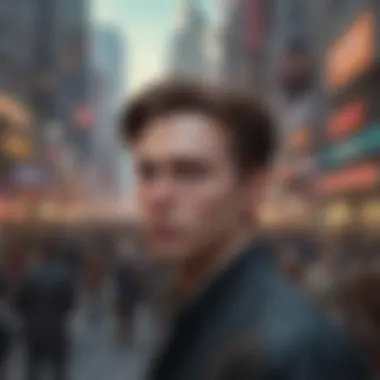

Intro
Aldous Huxley's 'Brave New World' has intrigued readers since its publication in 1932. It presents a chilling portrait of a future where society is organized around pleasure, consumerism, and conformity. As we navigate through the pages of this thought-provoking novel, we uncover layers of meaning about what it means to be human in a world driven by technology and efficiency.
The world that Huxley constructs is unsettling, often feeling uncomfortably close to our current reality. With themes such as the quest for happiness, the role of technology, and the impact of social conditioning, 'Brave New World' compels us to question our own societal structures. By examining the narrative from various angles, we can better understand the intricacies of Huxley's vision and the warnings embedded within.
This exploration aims not only to analyze the key themes and characters of the novel but also to illuminate the significance of Huxley’s work in our contemporary context. As we embark on this journey, it becomes evident that the reflections found in 'Brave New World' resonate deeply with the challenges we face today. Each turn of the page invites us to reflect on freedom and control, as well as the moral dilemmas stemming from a society increasingly reliant on technology.
Prologue to Brave New World
Aldous Huxley's "Brave New World" stands as a towering pillar in the realm of dystopian literature. Its significance is not just limited to its engaging narrative; rather, it weaves through a tapestry of ideas that force one to ponder the very fabric of society we inhabit today. Many readers find themselves captivated by the intricate dance of technology, control, and the essence of what it means to be truly free. This section uncovers the importance of understanding Huxley's vision and the buzz it created during its time.
The Author's Vision
Huxley's perspective was as clear as a bell yet as profound as a rolling ocean. He scrutinized the repercussions of unchecked technological advancement and consumerism that, to him, could lead to a dehumanized world. In his eyes, happiness was not just a personal quest; it could be engineered, manufactured, and commodified. The portrayal of a society where people are conditioned to shun individuality raises troubling questions about autonomy. Huxley was not warning against technology per se; instead, he shone a light on the potential pitfalls when society blindly embraces it, sacrificing core human values in the process. As such, the author's vision serves as a stark reminder to tread carefully in our pursuit of progress.
Historical Context
To truly appreciate the nuances of "Brave New World," one must gaze back at the socio-political climate of the 1930s. This period was marked by economic strife, the rise of totalitarian regimes, and burgeoning technological advancements that promised convenience but also laid the foundations for mass control. The shadows of World War I still lingered, casting doubts on human nature and societal organization. Huxley crafted his narrative against this backdrop, reflecting a world grappling with the consequences of industrialization and political repression. The unsettling nature of his predictions struck chords with readers who could sense the collective anxiety of their times.
Initial Reception
Upon its release in 1932, the reaction to "Brave New World" was as mixed as they come. Some hailed it as a monumental work of insight, while others were taken aback by its bold critique of society. Critics described it as both a warning and a fascinating exploration of human behavior in an unsettling future. The narrative sparked heated discussions across literature circles and common parlance. While some resonated with its cautionary tale, others felt Huxley had ventured too far into the realm of speculative fiction. This divergence in opinions only cemented its place in the literary canon, as it continued to evoke discussions about freedom and control long after initial publications.
Understanding the myriad dimensions of Huxley's work sets the stage for deeper exploration in the ensuing sections. With each layer peeled back, readers can appreciate the brilliance of his critique, prompting reflections relevant even in today’s high-tech world.
Core Themes of the Novel
The thematic core of Aldous Huxley's 'Brave New World' acts like the spine of a well-structured argument, giving depth and substance to its exploration of a society steeped in artificiality and control. These core themes are not just abstract ideas; they are windows into the very fabric of Huxley's cautionary tale about the consequences of sacrificing individuality for societal stability. Understanding these themes is essential, as they shed light on a narrative that remains remarkably prescient in today's context.
The Illusion of Happiness
Huxley intricately unveils the notion of happiness as a constructed veneer. Citizens of the World State experience a superficial sense of joy, largely derived from the consumption of the drug "soma" and the absence of personal conflict. Yet, this happiness is devoid of authenticity, built on a foundation of conformity. The illusion of happiness raises critical questions. Is true happiness achievable without struggle?
Many readers find themselves in ethical knots as they ponder whether the benefits of a carefree existence outweigh the loss of genuine emotional experiences. The characters, especially Lenina Crowne, often reflect a desire for deeper connections, subtly hinting at the emptiness of their artificially stimulated lives. Huxley’s vision serves as a reminder that happiness without depth is merely a fleeting concept.
Control versus Freedom
At the heart of 'Brave New World' lies a fascinating yet chilling tug-of-war between control and freedom. The society meticulously engineers its citizens from birth, not unlike a factory assembly line, stripping them of choice and personal autonomy. It’s a world where everyone belongs to a caste, predetermined by external dictates, essentially usurping their freedom to forge their own identity.
This theme is compellingly explored through Bernard Marx, who grapples with feelings of isolation in a system that champions conformity. His struggles compel the reader to assess their own lives in a world often categorized by consumerism and social expectations. Control in Huxley’s narrative doesn’t merely suppress freedom; it reframes the very concept of what it means to be human. The stark contrast between the imposed order of the World State and the chaotic individuality associated with freedom leads to a profound examination of the human spirit.
"The greatest happiness is not the absence of sorrow but the presence of joy."
The Role of Technology
Huxley’s narrative does not shy away from exploring the role technology plays in enhancing control and undermining authentic human experiences. In the World State, technology is wielded as an instrument of social stability rather than a means of progress or enrichment of life. From the reproductive technologies that determine one’s social standing to the entertainment that dulls critical thinking, technology’s omnipresence reveals a double-edged sword.
The pervasive use of technology highlights important discussions around its ethical implications. As readers, we might ask ourselves if societal advancements are always beneficial or if they come at the cost of our fundamental rights and humanity. For instance, the relentless consumption of mass-produced entertainment serves to pacify citizens and distract them from questioning their existence. Thus, Huxley warns against blind allegiance to technological progress without critically evaluating its impact on society.
The novel's ability to probe these critical themes, from happiness to freedom and technology, offers a rich tapestry for reflection. In a world increasingly shaped by analogous forces, Huxley's insights inspire readers to remain vigilant against the subtle encroachments on individual liberty and deeper human experiences.
Key Characters and Their Development
In any narrative, characters serve as the living threads that stitch together the fabric of the story. In Brave New World, Aldous Huxley deftly uses his characters not just as vehicles for his plot, but as profound reflections of the societal constructs he scrutinizes. The development of these multifaceted individuals allows the reader to delve deeper into the critique of a world where technology and control reshape humanity. Each character represents varied responses to the overarching themes of conformity, freedom, and identity, inviting readers to find echoes of their realities within the dystopian landscape.
Bernard Marx: The Outsider
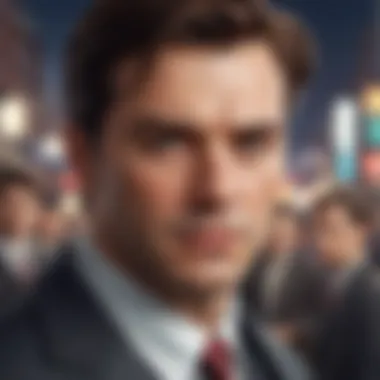
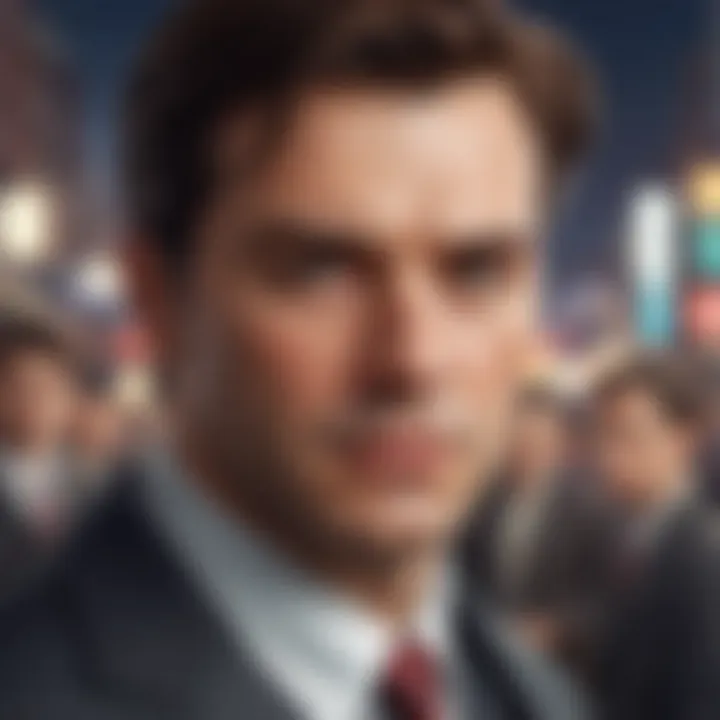
Bernard Marx stands out as a character drenched in the tension between belonging and isolation. Physically smaller than other Alphas, Bernard embodies the criticisms of a society obsessed with conformity. His dissatisfaction with societal norms breeds a sense of alienation, showcasing the burden of nonconformity in a world that values uniformity. His intellectual musings often leave him feeling like an outsider looking in. As he grapples with his place in a meticulously engineered society, the audience is encouraged to reflect on the value of individuality in a world that often stifles it.
Moreover, Bernard's pursuit of authenticity leads him to question conditioned behaviors and motivations that rule the lives of his peers. His character arc highlights the struggle against the mental chains of conditioning and the pursuit of genuine human experience. While often self-serving, it becomes evident that Bernard embodies a yearning for freedom and significance. His internal battles serve as a poignant reminder that individuality, when faced with societal pressures, can lead to profound uncertainty.
Lenina Crowne: Conformity and Conflict
In stark contrast to Bernard, Lenina Crowne represents the epitome of societal conformity. Her character is steeped in the pleasures and distractions that the World State offers. Engaging fully in the prescribed idea of happiness, she illustrates the consequences of unexamined allegiance to societal norms. However, beneath her seemingly shallow exterior lies a conflict that Huxley masterfully unravels.
Lenina's relationship with Bernard reveals a growing awareness of the tensions between her conditioned beliefs and her emerging emotions. Her confusion surrounding love and her feelings for John the Savage underscore a fundamental tension in the narrative: the clash between desire and social conditioning. As she navigates these complex emotions, her journey prompts readers to ponder whether true happiness can exist alongside deep connections and individual thought. The duality of her character raises essential questions about the price of conformity in a society that denies emotional depth.
John the Savage: Collision of Worlds
John the Savage exists as a bridge between the civilized world of the World State and the primal simplicity of the Savage Reservation. Raised outside the confines of technological advancement, he confronts the values of the World State with an unfiltered perspective. His character acts as a critique of both worlds—where one is devoid of genuine emotions and the other loses sight of progress and understanding.
His initial fascination with the civilized world quickly turns into horror as he witnesses the moral bankruptcy that the citizens accept. John's struggles symbolize the disillusionment faced by those who dare to challenge the status quo. His ultimate sacrifice reveals the conflict between individuality and societal oppression, reminding the readers of the profound struggles faced by those caught between conflicting ideologies.
"The Savage’s tragedy signals a loss, not only for himself but for humanity. Those who dare to dream of an ideal often find themselves lost in the dystopia created by their longing."
Through John, Huxley encapsulates the tragic tension between freedom and control, offering deep insight into the human condition.
The development of these key characters in Brave New World allows readers to explore complex dynamics of society, prompting profound reflections on conformity, individuality, and the often blurry line between happiness and oppression.
Societal Structures in Brave New World
In Aldous Huxley's Brave New World, societal structures play a fundamental role in shaping the characters and plot. Huxley creates a world where individuals are organized in a complex hierarchy that determines their worth, roles, and even happiness. Understanding these structures provides insight into the mechanisms of control that govern the lives of the citizens in this dystopia, drawing parallels to modern societal constructs.
The Caste System
At the heart of Huxley's narrative is the caste system, a rigid social stratification that defines the lives of all inhabitants. Ranging from the highly intelligent Alpha plus class to the lowly Epsilons, each caste is conditioned from birth to accept their predetermined roles. This division serves not only to maintain social order but also to enforce a sense of superiority and inferiority among the different groups.
By examining the caste system, it becomes evident how society values certain attributes over others. The Alphas represent intelligence and creativity, while the Epsilons signify manual labor and simplicity. This clearly delineated hierarchy prevents dissent and promotes consumerism, as individuals are less likely to question their placement within society when conditioned to find satisfaction in their roles. The consequences of such divisions lead to questions regarding identity, purpose, and freedom.
The Role of Conditioning
Conditioning is a powerful tool utilized by the World State to ensure compliance among its citizens. From a young age, individuals undergo a rigorous process of hypnopaedia (sleep-teaching) and behavioral conditioning. This systematic approach ingrains societal norms that influence desires, perceptions, and actions, making rebellion nearly impossible.
Huxley illustrates that conditioning molds the very essence of human experience. For example, children are often taught to embrace promiscuity and reject monogamous relationships, ensuring a superficial functioning of society. Such conditioning echoes real-world parallels where media and cultural influences shape beliefs and behaviors. Through this lens, readers are invited to consider the extent to which their own actions and thoughts may be influenced by external forces beyond their control.
Consumerism and Its Impact
Consumerism is another defining feature of the society depicted in Brave New World. The notion that happiness can be achieved through material possessions leads to a never-ending cycle of consumption. The mantra "Ending is better than mending" highlights the idea that replacing items is preferable to fixing them. This philosophy entrenches the belief that personal worth is tied to what one possesses rather than who one is as a person.
The narrative reflects contemporary concerns about overconsumption and the disposability culture that pervades modern life. People are taught to be always dissatisfied, forever seeking the next pleasure or luxury, which leads to a superficial existence devoid of deeper meaning.
Ultimately, Brave New World serves not only as a cautionary tale but also as a mirror reflecting the potential pitfalls of a consumer-driven society, where personal autonomy is sacrificed at the altar of convenience and conformity.
Philosophical Underpinnings
The philosophical underpinnings in Aldous Huxley's 'Brave New World' play a crucial role in understanding the intricate dynamics of the narrative. They serve not just as theoretical frameworks but as lenses through which readers can analyze the ethical dilemmas and social commentary embedded within the text. Delving into utilitarianism, existential themes, and the tension between dystopia and utopia, Huxley provides a rich tapestry of ideas that challenge the reader's perceptions of happiness, morality, and the human condition.
Utilitarianism in Practice
Utilitarianism, the ethical theory advocating for the greatest happiness for the greatest number, is vividly illustrated in the World State's societal structure. The regime prioritizes collective well-being over individual rights, often at a steep cost. Huxley paints a picture where citizens are conditioned from birth to accept their roles without questioning. For instance, through routine and artificial pleasures, people find contentment, but is this true happiness?
- "Everybody's happy now" is a recurring mantra, signifying an absence of personal strife.
- This blind adherence raises questions about the nature of freedom and the sacrifices made for societal peace.
Huxley invites readers to reflect on the morality of enforcing happiness by stripping away free will. The idea is unsettling. Do we forfeit our humanity in the pursuit of a stable society?
Existential Themes
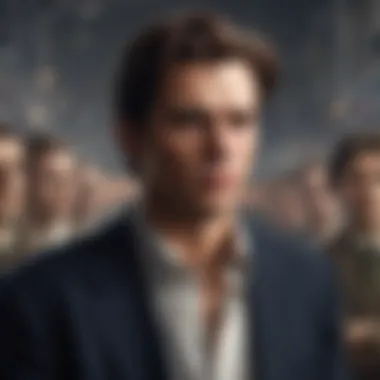

Existential themes pepper the novel, highlighting the internal conflicts faced by characters like Bernard Marx and John the Savage. Their journeys expose the emptiness of a superficially happy life devoid of authentic experiences.
- Conflict with societal norms: Bernard, grappling with feelings of isolation, questions the very foundation of the World State’s values.
- Soul-searching of John the Savage: John’s upbringing in the Savage Reservation bestows upon him a unique perspective, making his disillusionment with the Utopian society all the more poignant.
"I want to know what passion is," he exclaims, showcasing a yearning for genuine emotion in a sterile world.
Through these characters, Huxley captures the existential struggle that many individuals face in the modern age: finding meaning within a world that often prioritizes conformity over individuality.
Dystopia versus Utopia
The juxtaposition of dystopia and utopia is a recurring motif throughout the narrative, blurring the lines of what constitutes a 'perfect' society. Huxley constructs a world that at first glance appears utopian, but when examined closely, its underlying dystopian elements emerge.
- The shocking cost of peace: Citizens are engineered for stability, but this tranquility is built on a lack of autonomy and the suppression of emotions.
- Huxley’s chilling depiction of a society reliant on technological intervention raises pressing questions: Is a life devoid of suffering worth living if it comes at the expense of individuality?
The narrative does not merely serve as a cautionary tale; it flips the script on utopia. What might seem like paradise reveals itself as a calculated and oppressive environment, forcing readers to confront the uncomfortable truths about our current reality.
Cultural Reflections in Brave New World
In Brave New World, Aldous Huxley carefully weaves cultural aspects into the fabric of his dystopian society, presenting a mirror that reflects the values, beliefs, and follies of his time, which, remarkably, also map onto our own. This exploration of culture is not just an artistic choice but a crucial element that enhances the narrative's depth. Huxley critiques the commodification of art, the demise of genuine spiritual expression, and the entertainment-driven frenzy that ultimately leads to societal apathy. Understanding these cultural reflections is essential for readers, educators, and students alike, as they delve into the complexities of human behavior and societal structures.
Art and Entertainment
Art and entertainment in Brave New World serve not only as reflections of society but also as instruments of control. Whereas once art was a means for personal expression and cultural development, in Huxley's world, it is reduced to mere entertainment—a tool to placate the masses. The characters consume simplistic forms of entertainment, from feelies—movies that engage more senses than just sight—to mindless games such as centrifugal bumble-puppy. All this reflects a society that has traded creativity for distraction. The loss of art's depth and meaning highlights how consumer culture prioritizes instant gratification over intellectual stimulation.
"The greatest triumphs of art are eclipsed by shallow forms of entertainment, leaving humanity poorer in spirit."
In examining this cultural degradation, one can draw parallels to contemporary society where social media, streaming services, and viral trends often supersede significant artistic endeavors. Readers should critically assess how these forms of entertainment affect their values and personal experiences. It brings to mind the question: will genuine artistic expression survive in a world obsessed with base pleasures? This inquiry becomes especially pertinent as we consider the societal implications of Huxley's foresight.
Religion and Spirituality
Religious themes in Brave New World are depicted through a stark lens, highlighting the disintegration of genuine spiritual beliefs and practices. With the advent of a scientifically regimented society, spiritual fulfillment is replaced by state-sanctioned mantras and the worship of technology and stability."The infantile rituals—such as the solidarity service—replace authentic spirituality with a hollow imitation that reinforces conformity among the populace. The absence of real faith leads to existential voids, as true belief systems are replaced by superficial ideologies, further showcasing the dangers of a life devoid of meaningful connections.
In today's fast-paced world, where consumerism often overshadows spiritual thought, Huxley's depiction resonates deeply. It prompts educators and students to introspect on the evolution of spiritual practices and how they align (or misalign) with modern existence. While the novel presents a bleak depiction, it begs a pertinent question: can authentic spirituality coexist within a system that thrives on control and uniformity?
By examining these cultural reflections—both in Huxley's narrative and in our current society—readers gain critical insights that challenge their understanding of art, entertainment, and spirituality. Huxley pushes for a conversation about what it means to be human in a world that often prioritizes efficiency and pleasure over genuine connection and creativity.
The Critical Lens: Literary Analysis
Literary analysis serves as an essential tool for unlocking the depths of Aldous Huxley's 'Brave New World.' The importance of examining this work through various critical lenses cannot be overstated. This approach allows readers to dissect the novel's layers, revealing the intricate methods Huxley employs to craft his narrative. Scholars and students alike engage with this text not just for enjoyment but to comprehend its warnings about societal structures and the human condition.
Analyzing 'Brave New World' through different critical theories brings forth a multi-faceted understanding. For instance, engaging with structuralism prompts one to explore the underlying structures present in the language and themes. It enables an investigation into how Huxley's use of repetition or allusions works within the larger framework of the narrative. On the other hand, post-structuralism challenges readers to consider the ambiguities in the text, stressing that meaning is fluid and can vary based on the reader's perspective. In a world increasingly reliant on technology, these questions probe deeply into concepts of identity and autonomy, which resonate with readers today.
Structuralism and Post-structuralism
When diving into structuralism in 'Brave New World,' one uncovers the systematic patterns that shape Huxley’s world. The caste system—a rigid hierarchical structure—is not just a plot device but also a reflection of societal order. Characters like the Alphas, Betas, and Epsilons embody different values and functions within society, showcasing how individual identity is subsumed under collective categorization. As such, we see themes of conformity versus individuality springing forth, presenting challenges to the concept of self in a highly structured environment.
Conversely, post-structuralism plays a key role in illuminating the uncertainties encountered in Huxley’s vision. The text’s contradictions can lead to varying interpretations. For example, the use of the drug soma symbolizes both an escape from reality and an anchor to it, depending on one’s viewpoint. This makes the reader reconsider the nature of happiness and freedom—are they truly obtainable in such a world? The refusal to offer clear answers mirrors modern life's complexities, encouraging readers to grapple with interpretations over conclusions.
Narrative Techniques
Huxley’s narrative techniques enrich the reading experience through an array of stylistic choices. The use of free indirect discourse enables readers to traverse the minds of various characters, shedding light on their inner dilemmas. Observing how Bernard Marx perceives the World State offers layers to his alienation. In contrast, Lenina Crowne’s perspective demonstrates an unwavering acceptance of societal norms, creating a juxtaposition that heightens the critique of conditioning.
"Words can be like X-rays if you use them properly—they’ll go through anything."
– Aldous Huxley, indicating the power of language in narrative development.
Moreover, Huxley employs satire as a potent narrative technique. His sharp, often darkly humorous observations serve to critique consumerism and the triviality of the characters' lives. This can be seen in the way people engage with superficial pleasures, such as the endless pursuit of entertainment, illustrating the numbing effects of a meticulously engineered society. Through these techniques, Huxley invites readers to engage critically, prompting deeper conversations about the narratives we construct in our lives.
Brave New World in Popular Culture
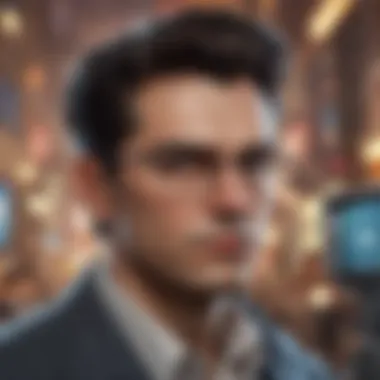

"Brave New World" has left a remarkable imprint on popular culture since its publication. The novel has not just been confined to the realm of classic literature; instead, it has permeated various forms of media, highlighting its enduring relevance. This section will explore how Huxley's reflections on society resonate across different platforms, making the themes of control, loss of individuality, and technological reliance resonate strongly today.
Adaptations in Film and Theatre
The adaptation of Huxley's dystopian narrative into film and theater underscores the urgency of its themes. Many adaptations have attempted to capture the essence of the novel, albeit with varying levels of fidelity. For example, the 1998 film directed by Bobby Roth was a notable attempt to bring the chilling world of Huxley to life. Although it garnered mixed reviews, it still introduced the story to a new audience, emphasizing the novel's circles of conformity and artificial happiness.
In contrast, the theatrical adaptations have taken creative liberties. Such performances often focus on the emotional undercurrents, allowing actors to explore character complexities more deeply. They can highlight the stark juxtaposition between social stability and personal suffering that runs throughout Huxley's story. Audiences witness this conflict in real-time, creating a more visceral experience.
Much is learned about cultural attitudes towards technology and freedom through these adaptations. Such portrayals raise crucial discussions on how a society might mirror aspects of Huxley’s vision, challenging viewers to examine their relationship with progress and its implications for their freedom.
References in Modern Media
Beyond cinematic interpretations, "Brave New World" finds its reflections in modern media, a testimony to its continual relevance. From academic discussions to social commentary, Huxley’s work permeates various outlets.
- Television Shows: Series like Black Mirror frequently echo the anxieties laid out in Huxley’s text, raising questions about the relationship between humanity and technology.
- Literature: Newer works of fiction often feature societal themes reminiscent of Huxley, with writers exploring the delicate balancing act between technological advancements and human integrity.
- Online Forums: Discussions on platforms like Reddit often dissect aspects of Huxley's world, offering a unique public discourse. These conversations can reveal how people interpret and critique the principles that Huxley laid out, providing a modern context to his critique on consumerism and identity.
As modern society grapples with similar issues as those presented in "Brave New World," these references in diverse forms of media serve to extend Huxley’s critique and provoke ongoing reflection on the implications of our choices.
Impact and Legacy
Aldous Huxley's Brave New World has left indelible marks not just in the literary realm but also in broader cultural discourses. The importance of this novel in contemporary society cannot be understated, as its themes resonate strongly with ongoing debates around technology, governance, and individual rights. The work acts as a lens, through which we examine the fragility of human values when faced with the seductive allure of convenience and happiness.
Influence on Dystopian Literature
Huxley's novel is often heralded as a cornerstone of dystopian literature, drawing connections to other seminal works in the genre. The notion of a highly controlled society where individuals are rendered passive through conditioning and consumerism set the stage for countless authors who followed. Notably, George Orwell's 1984 shares similar concerns about totalitarian control, but Huxley approaches the theme with a distinctive twist by presenting a world that forsakes discomfort for pleasure.
Brave New World has influenced a plethora of writers, leading them to explore the consequences of loss of autonomy and the impact of technological advancement.
Key Elements of Influence:
- Characterization: The archetypes established by Huxley, such as the outsider grappling with societal norms, have become prevalent in dystopian narratives.
- Societal Commentary: The critique of technological advancement and the subsequent moral implications urged authors to reflect on their own societal contexts.
- World-Building: Huxley’s vivid portrayal of a meticulously managed society serves as a template for constructing believable yet chilling dystopian worlds.
"Brave New World challenges readers to confront the dangers of unexamined pleasure and complacency in society."
Relevance in Contemporary Discussions
In today's landscape, issues surrounding personal autonomy, governmental surveillance, and the essence of happiness echo Huxley’s concerns. The dialogues he initiated regarding the trade-offs between security and freedom have only intensified with the advent of modern technologies.
Some examples of how Huxley’s themes manifest in contemporary discussions include:
- Surveillance and Privacy: The rise of digital surveillance mirrors the conditioning of citizens in Huxley’s world, raising questions about consent and control.
- Global Consumerism: The relentless pursuit for consumer goods, as depicted in the novel, bears a striking resemblance to today’s culture, where materialism often overshadows human connection.
- Mental Health: In a society increasingly reliant on pharmaceutical solutions for happiness, Huxley's warnings about dependence on artificial pleasures resonate deeply.
Classes, politics, and the media often reference Brave New World in discussions, fashioning it as a cautionary tale against the perils of unchecked technological growth and homogenized values.
Through its bold illustration of social dynamics, Brave New World not only remains a literary touchstone but also serves as a potent reminder of the delicate balance between innovation and the preservation of individuality in a world where the lines between progress and oppression are dangerously thin.
Epilogue and Reflections
Delving into the conclusions and reflections surrounding Aldous Huxley’s Brave New World reveals not just the text's intricate layers, but also the insights it offers for our contemporary society. The novel serves as a crucial mirror, reflecting our own world back at us and prompting critical examination of our values and choices.
The Importance of Critical Thought
Critical thought is a cornerstone in interpreting Brave New World. Huxley invites readers to question the implications of a society governed by superficial happiness and technological control. The narrative encourages individuals to resist complacency and to think beyond what is presented at face value. In education, the development of such thinking is paramount; it prepares students to tackle complex issues and forge their own paths rather than following the herd mindlessly. The critical lens fosters a sense of individual responsibility and ethical engagement that is sorely needed.
- Encourages questioning and introspection
Readers are urged to ask themselves: What sacrifices are made for comfort?
Does a lack of freedom truly equate to happiness? - Promotes resilience against societal pressures
The story highlights the dangers of conformity, reminding us that questioning norms is essential in a rapidly changing world.
"The greatest tragedy in life is not death, but a life without purpose.”
Heeding Huxley’s message means being vigilant as we navigate a world increasingly dominated by technology and consumerism.
Lessons for Future Generations
Huxley’s work resonates with increased urgency when placed in the context of today’s societal challenges. The lessons drawn from Brave New World extend beyond literary analysis, serving as a cautionary tale for future generations.
- Valuing individuality
In times when collective identity can overshadow personal expression, Huxley’s characters underscore the importance of embracing uniqueness while fostering genuine relationships with others. - The reality of escapism
In a world filled with distractions—from technology to various forms of instant gratification—Huxley teaches that escapism won't solve underlying issues. Instead, it is vital to face uncomfortable truths head-on. - The fragility of freedoms
As societies become more regulated, it becomes essential to remember how easily freedoms can slip away. Huxley's novel warns to remain vigilant against any push toward uniformity and normalized state intervention in personal lives.
In summary, Huxley's Brave New World challenges us to engage deeply with its themes and reflect upon our own societal trajectories. As we continue to grapple with the balance between technological advancement and ethical considerations, the lessons embedded in Huxley’s narrative will remain as relevant as ever.



